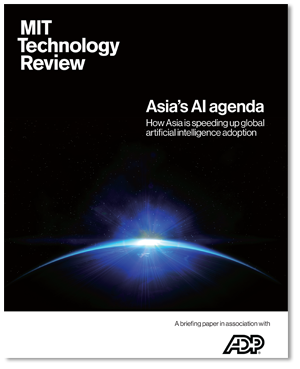Sponsored
Asia’s AI Agenda: Executive Summary
in partnership withADP
Asia-based senior executives at global companies believe that the impact of artificial intelligence (AI) and robotics on their business performance in Asia will be profound and positive—and will be felt sooner than we may think.

Table of Contents
Link to Full PDF
Executive Summary
Introduction
Positively Inclined
Human Capital and AI
Aware, But Unprepared?
Putting the 'AI' in 'Asia'
Survey Demographics and "Firmographics'
Infographics on AI
Outside of global robotics industry leaders Korea and Japan, most of Asia currently lacks the depth of technical skills and R&D facilities needed to keep pace with AI development. However, China, India, and other large Asian economies generate a copious amount of data, a tremendous “natural resource” that is critical to pushing AI’s capabilities forward.
Ironically, given the commonly held view that AI will be responsible for disintermediation of jobs at all levels, it is Asia’s massive human capital dividend—the billions of constantly Internet-connected workers and consumers—that will propel AI development in the region farther and faster.
MIT Technology Review's International Markets division surveyed more than 60 Asia-based senior executives to gather perspective on the impact of AI and robotics on Asia’s business landscape. Additionally, two dozen senior HR professionals were polled to assess the impact on jobs in Asia—and the future of their roles in particular. Several in-depth interviews were conducted with AI industry technologists, investors, and application developers. Key findings include:
- Overwhelmingly, respondents feel technological advancements in AI and robotics will have very positive effects on most industrial sectors in Asia.
- They also believe even more strongly that these technology advancements will specifically improve their own companies’ competitiveness.
- Executives also feel positively about AI’s ability to add value to their own industries, with the exception of financial service executives, who are generally less confident that automation and machine learning will create purely constructive benefits for their industry.
- Most C-suite respondents feel that AI will significantly improve their own competitiveness in Asia, especially their process efficiency and their ability to delve into customer data to achieve better insight. Again, financial industry responses lagged behind the average.
- Only a small percentage of respondents are currently investing in AI development in Asia. Twenty-five percent of respondents, however, indicate that their companies have already made investments at a global level—and another 50 percent are considering doing so.
- Some 70 percent of HR executives feel that AI and robotics adoption will result in significant job losses in Asia over the next five years. Unsurprisingly, nearly all of these respondents believe these technologies will have a major impact on their roles and functions in the future.
- Specifically, HR managers and talent professionals feel that their roles will evolve into broader and more strategic “productivity management” roles. Two-thirds of them say their roles will encompass management of both human and artificial talent in the next five years.
Keep Reading
Most Popular
Large language models can do jaw-dropping things. But nobody knows exactly why.
And that's a problem. Figuring it out is one of the biggest scientific puzzles of our time and a crucial step towards controlling more powerful future models.
How scientists traced a mysterious covid case back to six toilets
When wastewater surveillance turns into a hunt for a single infected individual, the ethics get tricky.
The problem with plug-in hybrids? Their drivers.
Plug-in hybrids are often sold as a transition to EVs, but new data from Europe shows we’re still underestimating the emissions they produce.
Stay connected
Get the latest updates from
MIT Technology Review
Discover special offers, top stories, upcoming events, and more.